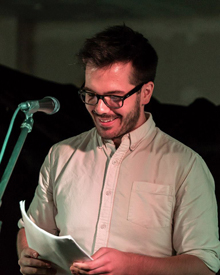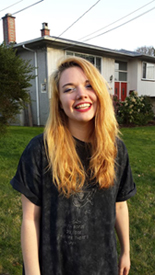Solidarity and Justice: Kelsey Lauder in Conversation with Joshua James Edgar

Fiction board intern Kelsey Lauder talks with Joshua James Edgar about the perceptions of hockey in Canadian culture and bringing justice to silenced female voices in "Jane Doe," Joshua's short story that appears in Issue #192, Autumn 2015 of the Malahat.
Situations similar to the case that occurs in “Jane Doe” continuously show up in the news these days, often with the same one-sided show of support from the community. What made you want to write a fictionalized version of these events?
I was in the last months of a journalism degree when the Steubenville verdict was announced. What followed was a barrage of American news coverage that emphasized the perpetrators’ sullied football dreams instead of the horrible crimes they’d been charged with, and while it was demoralizing to see this side of an industry I was hoping to graduate into, I also felt like so many vital conversations were coming out of both the verdict and its reportage. Most of the people in my life at the time were talking about how problematic it was that Americans worship their athletes from such a young age. But the thing was, I grew up in a hockey town, and I’d seen too many teenage hockey stars do awful things and get away them to believe that this brand of athlete worship was an “American problem.” So I started doing a lot of reading around sexual assault in hockey, from the minor level all the way up to the NHL (of which there’s a lot), and then I sought out any criticism that existed of the overwhelmingly athlete-sided coverage (of which there’s devastatingly little).
The decision to write a piece of short fiction around these subjects was one I weighed heavily. I am not a survivor of sexual assault. As a man, I don’t face the same threat of sexual assault that women confront on a daily basis. What I was interested in doing with this story was expressing my frustration with the ways these narratives are portrayed in Canadian media, and challenging the perceptions a lot of Canadians have about the role hockey plays in our culture. There’s this aphorism they throw around all the time in journalism school (which I’m learning now is attributable to Finley Peter Dunne), that the role of journalism is to “comfort the afflicted and afflict the comfortable.” To me, fiction has always shared this responsibility.
You left the details of the rape and the protagonist’s loss of virginity largely to the imagination of the viewer. The use of trigger warnings has received a lot of scrutiny lately. Did you consider this when writing about rape, and did you feel you had a particular obligation to the Jane Doe character, since she represents so many real women?
The trigger warning debate is very interesting to me, and while it was certainly something I was conscious of while drafting this story, my decision not to detail the assault came from a place of respect for real survivors of sexual assault. The voices of these survivors are so vital to the discourse, but they very simply aren’t my stories to tell.
That said, I absolutely had an obligation to the Jane Doe character because, as you suggest, there is very little that is fictional about a character whose placeholder name is the name used to protect the identities of so many real-life survivors. That responsibility meant treating the subject matter with the seriousness and sensitivity it deserves.
Anonymity has an important role in this story. How does the protagonist’s dissociation from her own identity contribute to her initial decision to stick with Darby through the trial?
The protagonist’s namelessness is there to echo the forced anonymity of the Jane Doe character. There’s a definite solidarity the protagonist feels for this other young woman: the environment of athlete worship in the town where they live has robbed both of them of an identity; Jane Doe in a literal sense (and for her own protection, no doubt), and the narrator in a more abstract one.
As you suggest, the protagonist’s namelessness is also connected to her decision to stay by Darby’s side over the course of the trial. In anonymity she exercises her ability to choose when so many important life decisions seem to be made for her. While she may be continuously shoehorned into the role of “supportive girlfriend,” her identity, and her right to withhold it, is her own.
What is your process for writing a short story? Do you get an idea and run with it, or do you begin with a more structured plan?
Right now I’m moving past my infancy as a fiction writer and realizing that process in general is sort of shitty and unmagical. For me, process connotes some combination of having a hot drink beside me, watching basketball highlights on YouTube, pacing around my apartment, being mean to the people who care about me, and filling pages very, very slowly. And most of the time I’m convinced that the work I pour into a piece won’t make it better, but after a few days I usually realize that I was wrong, that writing anything good mostly just means not giving up, which is frustrating because it’s both a corny realization and it forces me to resign myself to hard work.
I think the “get an idea and run with it” approach you pose there would be a pretty close description of what usually goes on when I start a new writing project. Most of my stories get their legs when I think something is interesting and then surprise myself by how often my mind returns to it. It’s sort of a process of weirding myself out by how little I understand my own fascination with something, being motivated to further explore the subject in question, and getting to know myself a little better in doing so.
What is your next writing project?
Right now I’m finishing up the four stories I’ve been dividing my focus between, each of which I love dearly and am very excited about. My goal is to have those out in the ether very soon and to start working on drafting my first novel, which will be about Southern Ontario motorcycle gangs between the 1970’s and present day, among other things. If anyone reading this has advice on writing your first novel without losing your friends/family/hair/mind, please be forthcoming!

Kelsey Lauder
* * * * * * * *









